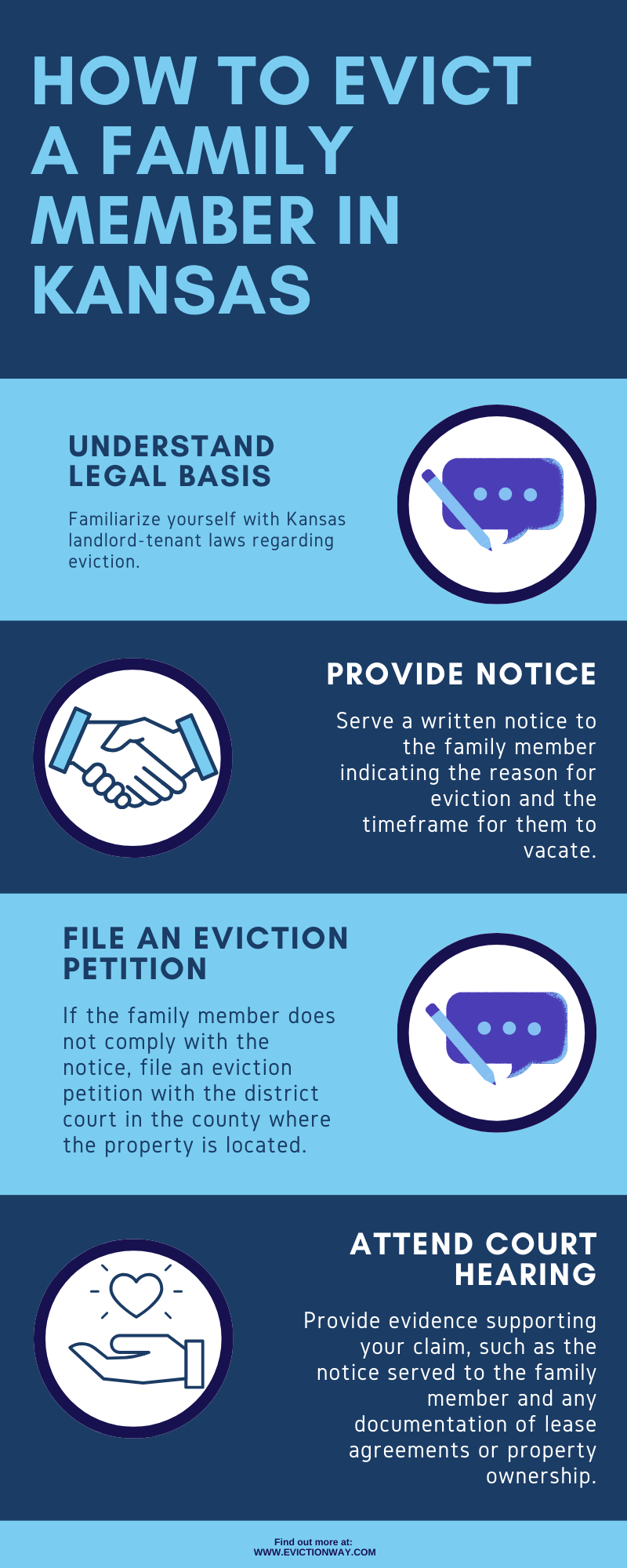Evicting a family member can be a difficult and emotional process, especially in Kansas. However, it is important to know your rights and the legal process involved in order to protect yourself and your property. In this blog article, we will discuss how to evict a family member in Kansas, including the best way to approach the situation, the legal steps involved, and tips on removing a family member politely.
The first step in evicting a family member is to determine if you have legal grounds to do so. In Kansas, you can evict a family member if they have violated the terms of their lease or rental agreement, if they have caused damage to the property, or if they have engaged in illegal activity. Once you have determined that you have legal grounds to evict your family member, you will need to follow the proper legal procedures.

In Kansas, you must give your family member written notice to vacate the property. The notice must state the reason for the eviction and the date by which your family member must leave. If your family member does not vacate the property by the deadline, you can file an eviction lawsuit with the court. The court will then hold a hearing to determine whether or not to grant your request for eviction.
How To Evict a Family Member In Kansas
Evicting a family member can be a difficult and emotional process. However, it is important to remember that you have the right to protect your property and your rights as a landlord. If you are considering evicting a family member, it is important to follow the proper legal procedures.
1. Give Notice
The first step in evicting a family member is to give them written notice. The notice must state the reason for the eviction and the date by which they must vacate the property. The notice must be served in person or by certified mail.
2. File a Complaint
If the family member does not vacate the property by the date specified in the notice, you will need to file a complaint with the court. The complaint must state the facts of the case and the relief you are seeking.

3. Serve the Complaint
Once you have filed a complaint, you will need to serve it on the family member. The complaint can be served in person or by certified mail.
4. Attend the Hearing
After the complaint has been served, a hearing will be scheduled. At the hearing, you will have the opportunity to present your case to the judge. The family member will also have the opportunity to present their case.
5. The Judge’s Decision
After hearing both sides of the case, the judge will make a decision. The judge may order the family member to vacate the property or may dismiss the case.
6. Enforcing the Judgment
If the judge orders the family member to vacate the property, you will need to enforce the judgment. You can do this by hiring a sheriff to evict the family member.
Evicting a family member can be a difficult and emotional process. However, it is important to remember that you have the right to protect your property and your rights as a landlord. If you are considering evicting a family member, it is important to follow the proper legal procedures.

Additional Resources for Kansas eviction help:
3 day eviction notice Kansas
In Kansas, a 3-day eviction notice indeed serves as a legal document that landlords can utilize when tenants breach their lease agreements.
This notice essentially notifies tenants that they have three days to rectify the violation or vacate the premises. It’s a crucial step in the eviction process and provides tenants with a final opportunity to resolve the issue before further legal action is taken.
You can download 3 day eviction notice Kansas here.
10 day eviction notice Kansas
In Kansas, a 10-day notice to quit for non-payment of rent is a document used by landlords to inform tenants they’ve missed rent. It gives the tenant 10 days from the date they receive the notice to do one of two things:
- Pay the rent in full
- Vacate the property
If the tenant doesn’t comply within the 10 days, the landlord can then proceed with filing an eviction lawsuit in court.
You can download 10 day eviction notice Kansas here.
How Much Does it Cost to Evict a Family Member in Kansas?
The cost of evicting a family member in Kansas can vary depending on several factors, such as the county in which you live, the complexity of the case, and whether you hire an attorney. In general, you can expect to pay anywhere from $500 to $2,000 in court costs and attorney fees.
| Expense Category | Estimated Cost ($) | Notes |
|---|---|---|
| Filing Fees | 50 – 150 | Cost differs by county and case complexity. |
| Attorney Fees | 100 – 500+ | Varies greatly depending on the attorney’s rates and the complexity of the case. |
| Service of Process | 15 – 100 | Fee for serving the eviction notice to the family member. |
| Locksmith | 50 – 200 | If changing the locks is necessary. |
| Storage for Belongings | Varies | Depends on how much property there is and the length of storage. |
| Court Costs (if contested) | Varies | Additional costs may incur if the family member contests the eviction. |
- If you are representing yourself, you will need to pay the filing fee, which is typically around $100. You may also need to pay for service of process, which is the cost of having the eviction notice delivered to your family member. This can cost anywhere from $50 to $100.
- If you hire an attorney, you will need to pay their hourly rate, which can range from $100 to $500 per hour. The attorney will also charge you for any expenses they incur, such as filing fees and service of process.
FAQs: Evicting a Family Member in Kansas
Here are some of the most frequently asked questions about evicting a family member in Kansas:
What are the grounds for evicting a family member in Kansas?
In Kansas, you can evict a family member if they have violated the terms of their tenancy, such as not paying rent or breaking the lease. You can also evict a family member if they are causing a nuisance or disturbance to other tenants or neighbors.
What is the process for evicting a family member in Kansas?
The process for evicting a family member in Kansas is similar to the process for evicting any other tenant. You must first give the family member a written notice to vacate the property. The notice must state the reason for the eviction and the date by which the family member must leave. If the family member does not leave by the date specified in the notice, you can file an eviction lawsuit with the court.
Can I evict a family member without going to court?
In some cases, you may be able to evict a family member without going to court. If the family member is willing to leave voluntarily, you can sign a written agreement that states the terms of their departure. This agreement should be signed by both you and the family member and should be notarized.

What are the penalties for illegally evicting a family member in Kansas?
If you illegally evict a family member in Kansas, you could be subject to criminal charges. You could also be sued by the family member for damages.
What resources are available to help me evict a family member in Kansas?
There are a number of resources available to help you evict a family member in Kansas. You can contact your local legal aid office or the Kansas Bar Association for assistance. You can also find helpful information on the website of the Kansas Landlord-Tenant Association.
Related:
